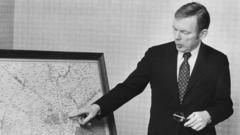Charles Dolan, the billionaire and television pioneer, passed away at the age of 98, marking the end of an era for cable television. As a transformative figure in the industry, Dolan significantly contributed to the evolution of how people consume media, particularly in New York City during the 1960s and 70s.
Starting with his Teleguide service, Dolan's innovative approach involved selling specialized programming directly to hotels, tapping into a burgeoning demand for entertainment. His pivotal deal with the city in 1964 enabled him to wire several Manhattan buildings with cable, which laid the groundwork for wider accessibility.
To engage viewers, Dolan secured broadcasting rights for the Knicks and Rangers playoff games, creating a loyal fan base. In the years that followed, he founded Home Box Office (HBO), a game changer in the movie and entertainment landscape. Eventually, he sold HBO and his cable service to focus on building Cablevision, which expanded to deliver television and internet services to countless homes across the Northeastern United States.
In a significant business move in 2015, the Dolan family sold Cablevision to the European telecom company Altice for nearly $18 billion, solidifying their legacy in the industry. At the time of his death, Dolan's wealth was estimated at $5.4 billion by Forbes, showcasing the impressive scale of his accomplishments.
However, the Dolan family often faced public scrutiny, becoming a point of contention for many New Yorkers, particularly due to an underwhelming performance by the Knicks and contentious programming decisions that occasionally limited access to major events like the Academy Awards and the World Series.
Charles Dolan's contributions to media and broadcasting have left an indelible mark on the industry, shaping the television landscape as we know it today.





















